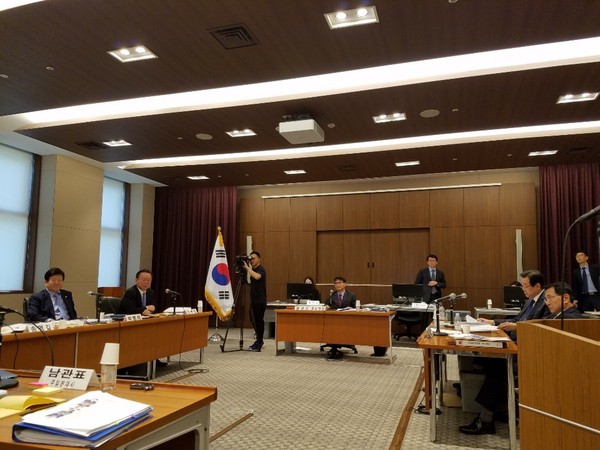 |
|
The National Assembly’s Foreign Affairs and Unification Committee holds a parliamentary audit at the South Korean Embassy in Tokyo on Oct 4.
|
Says anti-Korea sentiment in Japan is “more widespread” and "deep-rooted" than Koreans realize
During a parliamentary audit on Oct. 4, South Korean Ambassador to Tokyo Nam Gwan-pyo said that “South Korea-Japan relations are currently in a grave situation.” “Anti-Korean sentiment in Japan is strong and more widespread than Koreans realize,” Nam added. “It has deep roots.” Nam made the remarks while briefing members of the National Assembly’s Foreign Affairs and Unification Committee, who had visited the South Korean Embassy to Japan on Friday to conduct a parliamentary audit. “The South Korean government will continue to seek a calm and quiet resolution to pending issues, including historical disputes, while maintaining a clear-eyed view of history,” the ambassador said. When Democratic Party lawmaker Kim Bu-gyeom asked Nam to rate South Korea-Japan relations on a scale of one to 10, assuming that 10 is the best their relationship has ever been, Nam said, “I guess I would rate it at a three or four.” Most of the committee members expressed their hope that a solution will be found for the two countries’ conflict by the time the enthronement ceremony for Emperor Naruhito is held on Oct. 22. “We should take the upcoming enthronement ceremony as an opportunity to improve relations with Japan,” said Kim, who then asked Nam what he thinks about a senior official from the South Korean government attending the ceremony — perhaps even South Korean President Moon Jae-in. “I’ve been saying for a while that the leaders of South Korea and Japan need to hold a summit in order to resolve this conflict. But the decision of who exactly will attend the ceremony hasn’t been made yet,” the ambassador said. “We need to stick to four principles in resolving the South Korea-Japan conflict: respecting the Supreme Court’s decision, upholding our claims agreement with Japan, gaining the understanding and consent of the victims [of forced labor], and pursuing a forward-looking relationship with Japan. The leaders of our two countries can meet in secret for a candid discussion. Not only the Japanese Prime Minister but also the South Korean President could be present at the enthronement ceremony, after all,” said Park Byeong-seok, another lawmaker with the Democratic Party. Yun Sang-hyeon, a lawmaker with the Liberty Korea Party, called for a solution to be found by the time of the enthronement ceremony of Emperor Naruhito and added that the South Korean figure who attends the ceremony should be a senior official — “the more senior, the better.” Democratic Party lawmaker Song Yeong-gil argued that South Korea should give Japan back the 1 billion yen (US$9.36 million) it received as part of their comfort women agreement. “Prime Minister Abe used to be extremely pro-Korea. But he’s turned us into a virtual enemy and exploited that in domestic politics in a bid for emotional unity in Japan. That’s also true about the South Korean president,” said Liberty Korea Party lawmaker Kim Moo-sung. By Cho Ki-weon, Tokyo correspondent Please direct comments or questions to [english@hani.co.kr]






